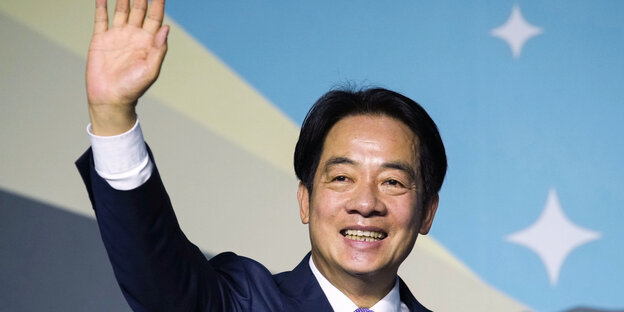Taiwan once again elects a president, William Lai, who wants to keep his distance from China. Beijing supporter Hou Yu-ih also gets many votes.

Lai Ching-te (also called William Lai), presidential candidate of the ruling Democratic Progressive Party (DPP), celebrates his election victory Photo: image alliance/dpa/kyodo
TAIPEI taz | When William Lai appeared before the press shortly after his election victory, he had a clear message prepared for Beijing: “We have shown the world how much we value our democracy,” says the 64-year-old with a wide, victorious smile. And then he adds another blow: the Taiwanese have shown that they can resist influence attempts from the outside. Only the 23 million inhabitants can decide on the future of their country, and no one else.
Outside the media tent, tens of thousands cheered their new president, including 34-year-old Roderik Tseng. “I am very happy with the result because Lai is doing the right thing for Taiwan. “This brings Taiwan closer to the international community,” says the trained baker.
With around 40 percent approval, William Lai (Lai Ching-te) of the incumbent Democratic Progressive Party (DPP) achieved a clear victory. His opponent, Hou Yu-ih of the pro-Beijing Nationalist Party (Kuomintang-KMT), obtained only 33.5 percent, while third-place Ko Wen-je of the People's Party (TPP) obtained about 26 percent. There is no second round.
Voter turnout was quite high, almost 72 percent. In the country's young democracy, the same party is now head of state for three consecutive legislative terms for the first time.
“We want to maintain our democratic lifestyle”
“As president, I have a great responsibility to maintain peace and stability in the Taiwan Strait,” Lai said. At the same time, however, they are determined to defend Taiwan against current threats from China: “Taiwan has not engaged in any provocative actions. “We just want to maintain our democratic lifestyle.”
For Beijing, however, the election result actually represents a bitter setback: the Chinese government sees the former Harvard student and doctor as a “stubborn defender of Taiwanese independence” who would promote “separatist activities.” The People's Republic of China has categorically rejected any attempt at negotiation.
Anyone who walks through Taiwan's capital over the election weekend will quickly realize why the small island state with its 23 million inhabitants represents a threat to its power in the eyes of the leader of the Chinese party and state, Xi Jinping. . Because Taiwan presents the Chinese with the reflection of an alternative reality: a culturally Chinese country that is home to a lively civil society, free media and a politically interested population.
This Saturday, Taiwanese were able to exercise their democratic rights at more than 18,000 polling stations. May Yeh flew halfway around the world to do this. “I want Taiwan to remain free,” says the elderly woman living in California, explaining her most important electoral concern: “China should not come to us.” That is why she voted for the PDP candidate, William Lai.
“China has become too aggressive,” says her friend Alice Chow, who also came from the United States because there is no mail-in voting. She has no illusions about Beijing's system: one day, a friend of her daughter's, a Chinese citizen, suddenly disappeared, without explanation or legal process. It is believed that her job at the American consulting firm McKinsey may have been her undoing. In Xi Jinping's China, even market research can quickly be interpreted as a violation of national security.
Xi Jinping always threatens Taiwan with military coercion
There is no doubt that the increase in repression in China has shaped the image of many Taiwanese towards their large neighbor. Xi Jinping, 70, periodically repeats his plans to reunify with the “breakaway province,” if necessary through military force.
The vast majority of Taiwanese do not want to hear about such developments and even have a deep hatred towards the Chinese communist government. But Huang Hsuan-gung still wants more exchanges with his northern neighbor. On Saturday, the 68-year-old went to the market around the traditional Longshan Temple, where most retirees spend their time playing Chinese chess and social gossip. But despite the pleasant afternoon sun under the palm trees, different political ideas collide here.
Huang, for example, clearly identifies culturally as Chinese and laments that young people are losing access to their roots. “Young people are already exposed to cultures from around the world. “Yet Taiwan is part of China,” she says.
Another pensioner immediately interrupts him. “The correct position is that Taiwan and China are two separate countries,” says Lim Wei-chieh. The island has been colonized several times in recent centuries: by the Netherlands, Spain and China. “But that doesn't mean we are part of China,” says the 70-year-old.